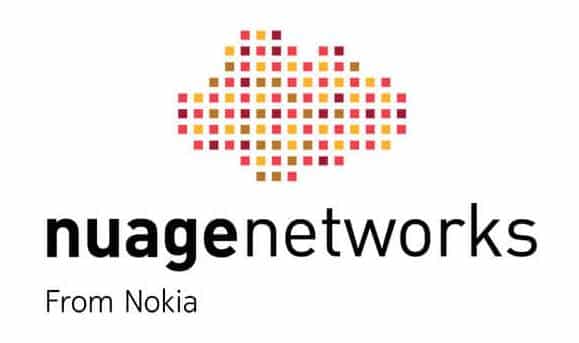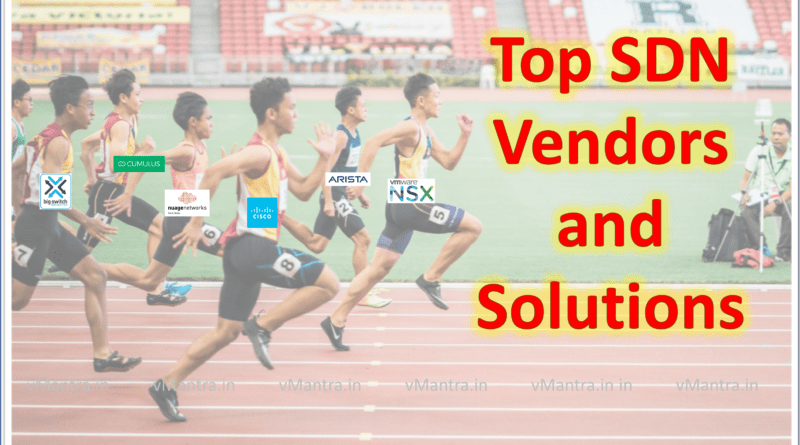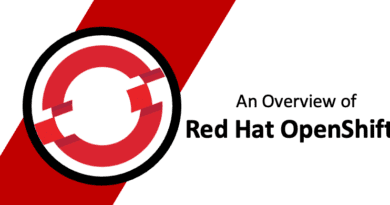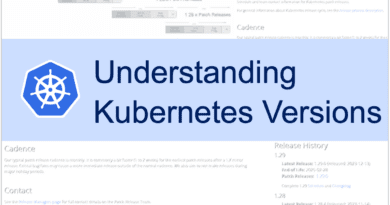Top SDN Vendors and their Solutions
Software-Defined Networking (SDN) has changed the way of computer networking by simplifying the management of network resources & functions and also giving the programmable interface. It solves the industries long-running/pending challenges like Vendor lock-in, high CAPEX/OPEX, Network automation and Agility. That’s the reason Service Providers are in transition to Software Defined Networking (SDN). As per the latest Market Analysis report done by Data Bridge Market Research, Global SDN Market is expected to rise to an estimated value of USD 67.98 billion by 2026, registering a CAGR of 28.90% in the forecast period of 2019-2026. However, the list of SDN Vendors is too long. But, In this blog, we will see only the Top SDN Vendors and its Solutions.
Following are the Industry leading in SDN Vendors:
Top SDN Vendors and Solutions:
Cisco ACI:
If it’s about networking, the first name that comes to mind is Cisco. The industry-leading company in the network world fully acquired the start-up Insieme in 2013 (in which Cisco already had an 85% stake) and brought ACI, a new fabric-based data center architecture to the market, the industry leader in the legacy network has now become one of the dominating industry leaders in the SDN Market as well. Cisco ACI or Application Centric Infrastructure is SDN (Software Defined Network) solution that works along with a software controller Cisco Application Policy Infrastructure Controller (APIC), and Nexus 9000 series Switches.
It offers:
- 6x Higher Throughput
- 5x lower latency
- 2x Faster Data Backup
- Nearly Zero fail-over convergence times
- Protects heterogeneous workloads; i.e., physical servers (bare-metal), virtual machines, and containers across multiple data centers using micro-segmentation.
- Full automation
- Micro-segmentation to ensure the appropriate level of security
- Single management console
Good
- Good Technical Support
- Easy Management
- Good Performance
- Easy Programmability
- Scalability
What’s Not Good:
- Vendor lock-in
- High CAPAX
- High Cost of Licenses
- Lack of Documentation
- Lack of Competency in the market
- Difficult Implementation
- Hard to troubleshoot potential issues
- Integration with 3rd party networks or other protocols is too complicated or limited.
Why are customers purchasing this product?
- Create internal/operational efficiencies
- Drive innovation
- Improve compliance & risk management
- Improve business process agility
What are the key factors that drive to purchase decision?
- Product functionality and performance
- Product roadmap and future vision
- Pre-existing relationships
- Strong services expertise
VMware NSX:
VMware NSX for Data Center is an industry-leading SDN solution. It came into the picture when VMware acquired Nicira in 2012, and after one year, VMware launched the first NSX released in October 2013. It’s purely an Overlay networking solution and can work with any underlying switches. NSX provides a full range of networking capabilities in virtualized form. It means you can create a huge overlay network of virtual Routers, Edge Gateways, Logical Switches, Firewalls, Load Balancers, and VPNs with a lot of Networking Services without using a single proprietary hardware network component.
VMware offers NSX in two variants, NSX-v and NSX-T, where NSX-v is only for the vSphere hypervisor. NSX-T works with most of the modern infrastructure like OpenStack, KVM, Kubernetes, OpenShift, AWS, Azure, and even bare-metal.
It offers:
- Context-Aware Micro-segmentation
- Multi-Cloud Networking
- Network Automation
- Cloud-Native Apps Support
- Distributed Stateful Firewalling
- Cloud Management
- Third-Party Integration
Good:
- Easy integration with the different platforms with NSX-T
- Better User Interface (GUI)
What’s Not Good:
- No Underlay solution provided
Nokia Nuage Networks:
The world leader in telecom, Nokia offers its software-defined networking solution Nuage Networks Virtualized Services Platform (VSP) which delivers state of the art policy-based automation across the network. VSP is based on its own Virtualized Services Controller (VSC) and two other key elements Virtualized Services Directory (VSD) and Virtual Routing and Switching (VRS). It provides an entire range of products to optimize datacenter, cloud and SDN operations.

It offers:
- Open Platform
- Fully Orchestrated
- Granular Security
- Application-Aware Routing
- 50% Reduction in OPEX / CAPEX
- 45% Reduction in TCO (Total Cost of Ownership)
- 40% Increase in Asset Utilization
- 35% Reduction in Support Times
- 20% Reduction in Development Times
- 10% Improvement in Service Times
What’s Good:
- Stability
- Pricing
- Performance
- Secure
- Mature Solution
- Fast response to customer queries
- Easiest product to integrate into legacy equipment.
- Truly End to End Solution offering Underlay and Overlay
- Easy to troubleshoot
- Highly Competent team
What’s Not Good:
- Less Documentation
- No Open Community
- Complex initial configuration
Top Companies using Nuage Networks:
3UK, Airtel, BT, China Mobile, China Telecom, Etisalat, NTT Data, Orange, OVH, Philips, Rostelecom, Telenor, Telia, Telefonica, Vodafone etc..
Why are customers purchasing this product?
- Cost management
- Drive innovation
- Create internal/operational efficiencies
- Improve business process agility
What are the key factors that drive to purchase decision?
- Product functionality and performance
- Strong services expertise
- Strong customer focus
Juniper’s Contrail Network:
Juniper Networks entered the software-defined networking (SDN) market with their product Contrail Networking in 2013 after acquiring Contrail Systems in 2012. In parallel, It also started an open-source community OpenContrail to get the contribution from developers. But again, in 2018, to give more strength, the ownership of the OpenContrail project was given to The Linux Foundation and renamed Tungsten Fabric.
Juniper Contrail Networking provides the connectivity to any kind of application running on VM, container or even bare-metal servers through the overlay network.
It offers:
- Easy operations
- On-demand customization
- Scalable and stable
- Detailed Analytics
- Routing and Bridging
- Load Balancing
- Security and Multitenancy
- Elastic, Resilient VPN
- Gateway Services
- High Availability
- Analytics Services
- API Services
What’s Good:
- Simple
- Open Standards
- High Scale and Performance
- United Multi-cloud Policy
- Seamless Integration
Why are customers purchasing this product?
- Create internal/operational efficiencies
- Drive innovation
- Improve business process agility
What are the key factors that drive to purchase decision?
- Product roadmap and future vision
- Product functionality and performance
- Pre-existing relationships
Big Switch Networks:
Big Switch Networks is a US-based cloud and data center networking company founded in 2010. It’s a big name among the top SDN vendors. Its flagship product Big Cloud Fabric (BCF), along with its Switch Light software, provides Openflow-based Software Defined Networking solutions for private, public, hybrid cloud, and multi-cloud environments.
It Offers:
- Reduces management consoles by over 60:1
- CapEx costs by over 50%
- REST API Integration
- Zero Touch Fabric (ZTF)
- Fabric Analytics
- Tenant-aware Fabric
- Service-aware Fabric
- Scale-out (Elastic) Fabric
What’s Good:
- Physical + Virtual fabric based on open SDN principles at each level of implementation.
- Less Total Cost of Ownership (TCO)
- Fast service enablement
- Automation
- Zero Touch Operation
- Simple Operations
- Seamless Integration with 3rd party vendor products like VMware NSX, OpenStack, OpenShift, Kubernetes etc.
- Public, Private, Hybrid and Multi-Cloud support
- Hardware Vendor choice
What’s Not Good:
- Lack of documentation
- Single point of failure of the controller.
- Switches only have one OOB management port.
- OOB port for doing management over IP. So basically if you lose that one IP management port, the switch can continue forwarding for things it’s already learned, but won’t learn any new MACs etc.
Cumulus Networks:
Cumulus Networks is computer network software company best known for its Debian Linux based network operating system, Cumulus Linux. This network operating system supports more than 30 bare metal platforms from industries top hardware vendors. The company is backed by a few VMware founders and emerged publicly in June 2013. Cumulus Networks has recently partnered with Nutanix to provide a hyper-converged infrastructure with Cumulus SDN and also signed a deal with Facebook for Minipack and became the first network operating system to support Facebook’s Minipack and contributed to the Open Compute Project (OCP).
It offers:
- 95% Improved Time to Production
- 33% less CAPEX
- 74% less OPEX
- Easy Automation
- NetQ Fabric Validation System
What’s Good:
- Flexible Network Operating System (NOS)
- Easy To Deploy
- Simple Architecture
- Stability
- Less TCO
- 3rd party Integration
- World-class Technical Support
What’s Not Good:
- GUI
- Less Documentation
- Support for a few protocols
Arista Networks:
Arista Networks has emerged as one of the fastest-growing SDN vendors in the Cloud Networking industry. It started its operation in early 2004 and, till the date, has deployed more than 20 million cloud networking ports worldwide. The core of Arista provided SDN solution is its Extensible Operating System (EOS), which is based on an unmodified Linux kernel. Arista EOS-backed routers and other virtual devices enable the user to run multiple network applications, Ethernet switching, and routing protocols on overlay networks with automated IT workflows.
It offers:
- Available Architecture
- Agile Work-X
- Automation
- Analytics
- Any Cloud API
What’s Good:
- Highly stable and feature-rich
- Excellent support
- Less TCO
- Self-Healing
- Real-time Streaming Analytics
- Any Cloud API
Why are customers purchasing this product?
- Cost management
- Drive innovation
- Improve business process outcomes
- Improve customer relations/service
What are the key factors that drive to purchase decision?
- Strong customer focus
- Product functionality and performance
- Product roadmap and future vision
Pluribus Networks:
Pluribus Networks was started in 2010 by three former Stanford classmates and got funding from Yahoo! founder Jerry Yang. This SDN vendors offers the solution with a different approach. It has developed a controller-less next-generation SDN solution, Adaptive Cloud Fabric and an open network operating system (NOS) Netvisor ONE.
It offers:
- Controller-less approach
- 30% less CAPEX
- 60% less OPEX
- Multi-tenancy
- Distributed network services (e.g., network slicing, edge computing, IoT and video traffic segmentation, L2VPN/L3VPN across distributed sites, multi-site unification).
What’s Good:
- No Costly Controller Required
- Less Total Cost of Ownership (TCO)
- Low Latency
- No Out-of-band management channel required
- Agility
- Performance
- Automation
Pica8:
It is clear that Software-Defined Networking solutions provide organizations with immense cost savings and greater flexibility in managing their networks. With the wide range of SDN vendors available, it is important to weigh the various features and benefits they offer in order to make an informed decision when selecting one from SDN vendors. Doing so will allow you to maximize the potential of SDN and reap its full benefits for your organization.
Thanks!!
Check out some more blogs:
- Configuring AWS Greengrass Core on VMware vSphere
- Deploying AWS Greengrass on VMware vSphere
- VNF Manager vs NFV Orchestrator (VNFM vs NFVO)
- Network Functions Virtualization (NFV)
- What is Hyper-Threading?
- Virtual Networking in VMware Workstation
- Hyperconverged Infrastructure
- Hyperscalers and Their Impact on the Digital Economy: A Comprehensive Analysis
If you like my blog “Top SDN Vendors and their Solutions”, Please Share…
–
best sd wan vendor, leading sd wan vendors, sd wan, secure sd wan, sd wan vendors, vmware sd wan, sd wan solution, juniper contrail vs cisco aci, sdn/nfv solutions, sdn nfv companies, software defined networking tools, cloud service monitoring, healthcare compliance management, analyze inventory data, active active data centers, simplify device deployment, healthcare regulatory compliance, best sdwan supplier, service provider sdn, wan optimization, sd wan solutions, sd wan technology





Nicely compared. Thanks for sharing